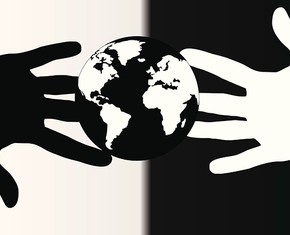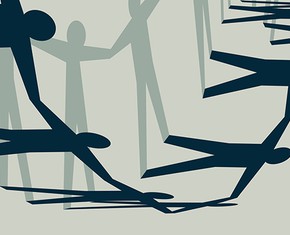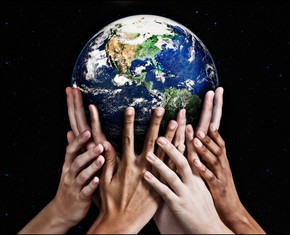The views expressed in our content reflect individual perspectives and do not represent the authoritative views of the Baha'i Faith.
If we look around us with discerning eyes, we can see a lot of good happening all around us. Progress happens, though at small incremental steps, even when society seems to be in chaos.
At the same time, in some spaces, social discourse has been diminished to shouting, and it often feels like no one is listening. The divide is so deep that cries of injustice can be heard in all corners. In the words of Baha’u’llah, the founder and prophet of the Baha’i Faith:
The world is in travail, and its agitation waxeth day by day.
It raises the question: Is hatred overtaking love?
The chaos and crisis we’re experiencing demonstrate the need for the recognition of the unity of humanity. The United States Department of Justice reported over 8,000 victims of hate crimes in 2019 — more than half were due to bias against someone’s race, ethnicity, or ancestry. And a recent report from the Center for the Study of Hate & Extremism at California State University, San Bernardino, found that in 2020, hate crimes against Asian Americans in major cities in the U.S. increased by 146%, and it’s common to hear of incidents of violence in the news.
RELATED: Will COVID-19 Cause Us to Backslide on Racism?
But let’s look at the big picture. Ten thousand years ago, our ancestors lived in caves, and their daily preoccupation was finding food, avoiding danger, and procreating. Since then, humanity has gone through ice ages, famines, floods, fires, wars, pandemics, and many other calamities. And yet, we survived. Today’s lifestyle is vastly different from that of our ancestors and constantly advancing from one generation to another.
Abdu’l-Baha, the son of Baha’u’llah and the head of the Baha’i Faith after his father’s passing, explained:
Unquestionably, through the manifestation of the Infinite Power in this glorious age, wonderful signs will appear in the world and great changes are seen in the present and promised in the future, for the Word of God is like unto the Spirit, and the contingent world like unto the embryo in the womb of the mother. Through the power of the Spirit such various changes and metamorphoses become apparent, transforming them from one form to another.
In my own life, I’ve had to change despair into action many times. I was born in the lowest caste of Hindu society, and this made me feel inferior to others for a long time. When I learned about the teachings of the Baha’i Faith on justice, the oneness of humanity, gender equality, and the elimination of prejudices, I committed to changing the world into a better place. But first, I had to analyze my own thoughts and behavior and begin to reprogram my subconscious mind to eliminate prejudice — both towards others and toward myself.
RELATED: What Do Baha’is Believe?
I recently heard Canadian Corey Fleischer’s story, which is an excellent example of making our world a better place. Fleischer is the founder of Erasing Hate, a grassroots project that removes racist graffiti from public spaces.
On his way to work one day, Corey noticed a swastika spray-painted on a street corner. This sight bothered him so much that he rescheduled an appointment to see a client for his power-washing company in Montreal and instead returned to the offending graffiti. As he erased the symbol of hatred with the force of the spray, Corey felt euphoric. In an interview, he said: “This feeling came over me that I’ve been searching for my whole life. Now I needed that feeling again.”
Proud of his Jewish heritage and able to remove the anti-Semitic symbol with tools from his power-washing company, Corey committed to erasing hateful graffiti of any kind, including messages of homophobia, Islamophobia, and slander against visible minorities. What’s in his heart comes out easily. He said, “It’s about being a good person. Forget stereotypes, forget about religion, and forget about putting people into groups. It’s about being a good person and about doing the right thing.”
Since then, his work has garnered international attention, and he gets requests for help every day from places all over the world. If Fleischer can’t physically get to your location, he’ll arrange for someone else to help out. An enlightened soul sees difficulties as opportunities and reacts positively.
We all want to do good — whether it’s for ourselves or our loved ones, the planet, or society at large. No matter how big or small, good deeds carry a double punch — we make a positive impact, and we feel great at the same time. Some of these deeds could be dedicating a portion of your income to charity, helping a friend in need, saving electricity by unplugging your devices when you aren’t using them, buying a gift for a loved one — just because, allowing a fellow driver to merge into your lane, writing a note to someone who won’t expect it, donating unneeded items in your house to a charitable organization, or using your talent to benefit others — such as performing magic tricks at a children’s hospital or playing music at a nursing home.
The Baha’i writings say:
The betterment of the world can be accomplished through pure and goodly deeds and commendable and seemly conduct.
You can also consider more systematic commitments — such as becoming involved in regular grassroots community-building activities, such as the empowerment programs for children and youth organized by the Baha’i Faith, or any other endeavors happening in your neighborhood. You could also commit to long-term changes to decrease your carbon footprint or reduce your use of plastic. You can lend your voice to social action movements, whether they’re existing organizations or starting — just like Corey did — to address systemic prejudice and build justice and harmony in your community.
















Comments
Sign in or create an account
Continue with Googleor